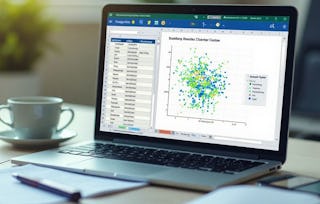The "Clustering Analysis" course introduces students to the fundamental concepts of unsupervised learning, focusing on clustering and dimension reduction techniques. Participants will explore various clustering methods, including partitioning, hierarchical, density-based, and grid-based clustering. Additionally, students will learn about Principal Component Analysis (PCA) for dimension reduction. Through interactive tutorials and practical case studies, students will gain hands-on experience in applying clustering and dimension reduction techniques to diverse datasets.

Clustering Analysis

Clustering Analysis
This course is part of Data Analysis with Python Specialization

Instructor: Di Wu
2,907 already enrolled
Included with
11 reviews
Recommended experience
What you'll learn
Understand the principles and significance of unsupervised learning, particularly clustering and dimension reduction.
Apply clustering techniques to diverse datasets for pattern discovery and data exploration.
Implement Principal Component Analysis (PCA) for dimension reduction and interpret the reduced feature space.
Skills you'll gain
Details to know

Add to your LinkedIn profile
6 assignments
See how employees at top companies are mastering in-demand skills

Build your subject-matter expertise
- Learn new concepts from industry experts
- Gain a foundational understanding of a subject or tool
- Develop job-relevant skills with hands-on projects
- Earn a shareable career certificate

There are 6 modules in this course
This week provides an introduction to unsupervised learning and clustering analysis. You will delve into partitioning clustering methods, such as K-Means and K-Medoids, understanding their principles and applications.
What's included
2 videos5 readings1 assignment1 discussion prompt
This week you will explore hierarchical clustering, a method that creates a tree-like structure to represent data similarities.
What's included
1 video3 readings1 assignment1 discussion prompt
This week focuses on density-based clustering, which groups data points based on their density within the dataset.
What's included
1 video3 readings1 assignment1 discussion prompt
Throughout this week, you will explore grid-based clustering, an approach that partitions the data space into grids for efficient clustering.
What's included
1 video2 readings1 assignment1 discussion prompt
This week introduces dimension reduction techniques as a critical preprocessing step for handling high-dimensional data.
What's included
1 video3 readings1 assignment1 discussion prompt
The final week focuses on a comprehensive case study where you will apply clustering and dimension reduction techniques to solve a real-world problem.
What's included
1 reading1 assignment1 discussion prompt
Earn a career certificate
Add this credential to your LinkedIn profile, resume, or CV. Share it on social media and in your performance review.
Instructor

Offered by
Explore more from Data Analysis
 Status: Free Trial
Status: Free TrialUniversity of Illinois Urbana-Champaign
 Status: Preview
Status: Preview Status: Preview
Status: Preview
Why people choose Coursera for their career

Felipe M.

Jennifer J.

Larry W.

Chaitanya A.

Open new doors with Coursera Plus
Unlimited access to 10,000+ world-class courses, hands-on projects, and job-ready certificate programs - all included in your subscription
Advance your career with an online degree
Earn a degree from world-class universities - 100% online
Join over 3,400 global companies that choose Coursera for Business
Upskill your employees to excel in the digital economy
Frequently asked questions
To access the course materials, assignments and to earn a Certificate, you will need to purchase the Certificate experience when you enroll in a course. You can try a Free Trial instead, or apply for Financial Aid. The course may offer 'Full Course, No Certificate' instead. This option lets you see all course materials, submit required assessments, and get a final grade. This also means that you will not be able to purchase a Certificate experience.
When you enroll in the course, you get access to all of the courses in the Specialization, and you earn a certificate when you complete the work. Your electronic Certificate will be added to your Accomplishments page - from there, you can print your Certificate or add it to your LinkedIn profile.
Yes. In select learning programs, you can apply for financial aid or a scholarship if you can’t afford the enrollment fee. If fin aid or scholarship is available for your learning program selection, you’ll find a link to apply on the description page.
More questions
Financial aid available,


